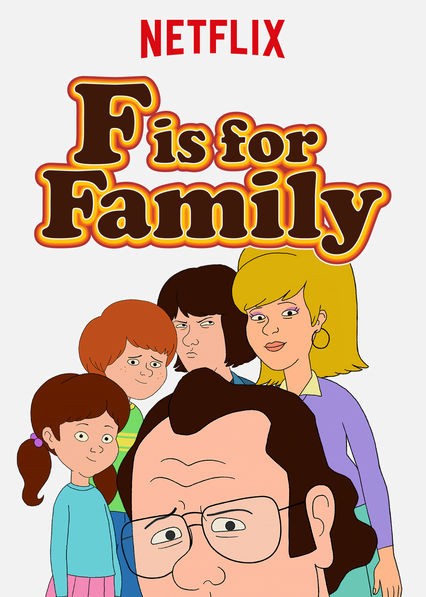In December 2015, Netflix released the first season of an original animated sitcom titled “F is for Family.” Netflix originals are part of the future of TV, which is already here in the 50-plus and counting shows and movies that it distributes. Most comedies taken in and/or put forth by Netflix have been widely received and gone on to produce multiple seasons.
A week before Christmas, “F is for Family” was an early gift to the world, especially to those college students just on break, already bored and desperate for anything to binge watch. It was created by comedian Bill Burr and writer Michael Price.
The six episodes culminate in a Christmas episode, then leave the viewer wanting more. It has received generally approving reviews, and although a second season has not been officially announced, there are high hopes.
Early 1970s, middle class, Nixon’s dearest — that’s the Murphy family. With Father Frank Murphy, a disgruntled conservative trying to raise a family and keep his wife from having too much power, Vic, the well-off liberal next-door neighbor and a 20-year proxy war going out with a bang, one can find hilarity in the dark and subtle humor of this family’s day-to-day life.
Near and dear to Murphy’s heart is the baggage department he heads at the local airport, boxing, beer and a TV crime series “Colt Luger,” that’s catch phrase “a man’s gotta do what a man does” is a reflection of the time period and the source of Murphy’s sense of worth and confidence.
Like all good family-focused shows, this cartoon explores the strengths and weaknesses of each character. Of course, comedy ensues, but it is not empty and emotionless.
Though “F is for Family” can be enjoyed by other viewers, young adults from families with siblings can easily appreciate the dedication to the representation of the Murphy’s still familiar family dynamic. In the first episode, Bill Murphy, a quiet and bookish middle child, turns out to be too curious for the family’s new color TV — an amenity just being popularized in this decade. The resolution is ingenious and reveals how different this boy is from his parents and siblings.
Though most viewers were probably not raised in the ’70s, there are some things that don’t change. This generally neutral statement also applies to the unfortunate racism that surfaces in Frank Murphy’s interactions with the community and his overt sexism that is presented, unaware of the depression of his wife.
This humorous display is accented by Murphy’s tendency to threaten to put his children through walls, and the love that holds him together after a tragedy in the final episode of the season.
Admittedly, the show has a rough start and may not initially draw in someone looking for perfect punchlines, but it is worth sticking out the first episode. After that, the show’s perversely sad, sardonic nature keeps curious watchers clicking “Next Episode,” as they can easily forgive the family for at first coming on so strong.
With an 8.1 out of 10 from Internet Movie Database and 82 percent from Rotten Tomatoes, this is not a comedy for everyone, but the Wildcat gives it an A.
Follow Gretchyn Kaylor on Twitter.









